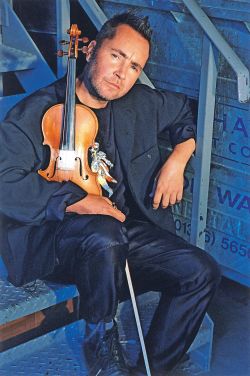| B i o g r a p h y |
 "Kennedy,"
as he has chosen to be known, is an individualistic and undeniably
talented violinist who has emerged as one of the bona fide stars of the
rich generation that came of age in the last quarter of the twentieth
century. He has made a point of discarding what he sees as the
conservative, staid traditions of classical concertmaking, and his
personality may be summed up as flamboyant.
"Kennedy,"
as he has chosen to be known, is an individualistic and undeniably
talented violinist who has emerged as one of the bona fide stars of the
rich generation that came of age in the last quarter of the twentieth
century. He has made a point of discarding what he sees as the
conservative, staid traditions of classical concertmaking, and his
personality may be summed up as flamboyant.
Born in 1956, Nigel Kennedy
started playing the violin when he was five. He attended the Sir Yehudi
Menuhin School in England, and later moved to New York to study at the
Juilliard School with the famous teacher Dorothy DeLay. Kennedy made
his debut in London in 1977, playing Mendelssohn's Concerto in E minor,
as standard a work as could be desired. In his early broadcast
appearances he exhibited a standard educated English accent. Later,
when he adopted the image of a punk musician, his accent shifted to
Cockney.
As his concert career grew, he was signed to a recording contract
with Britain's EMI label. His first recording of Elgar's Violin
Concerto was the 1985 Gramophone Record of the Year and rose to the top
of the charts in England, selling over 300,000 copies. He exceeded even
that mark with his Vivaldi Four Seasons disc, that even in the face of
the stacks of other recordings of that warhorse work eventually won a
listing in the Guinness Book of World Records as the best-selling
classical recording of all time.
Kennedy began to add jazz improvisations as encores to his concerts.
His concert demeanor and dress became more and more unconventional as
he cultivated a carefully scruffy appearance that evoked Britain's punk
rock scene. The violinist's new, decidedly nontraditional image proved
to have wide appeal, boosting his sales and putting several more CDs at
the top of the bestseller charts. Going further and further with his
attempts to shake up the classical establishment, Kennedy did crossover
performances and took on various eccentric mannerisms. His new ways
included trashing hotel rooms in the fashion of a rock star. In 1992 he
proclaimed that he was tired of playing "dead guys' stuff" and ceased
performing.
He spent the time playing privately with friends and writing, but
then edged back into playing with virtually unpublicized appearances at
places like Oxford and Cambridge. He returned to the concert stage
officially in 1997, and it was at this time that he asked to be called
simply "Kennedy." He had written a concerto based on the music of Jimi
Hendrix and frequently performed it with his band, "The Kennedy
Experience." EMI elected not to release Kennedy's rock performances,
but he found a congenial home for his new experiments on the
increasingly crossover-oriented Sony label. Rumors that he had given up
classical music entirely, or left EMI, appear to be untrue; new
classical releases, including a remake of the Elgar concerto, have
appeared on that label alongside the Hendrix album.
Early in his career Kennedy played the "Cathedrale" Stradivarius
violin, but at the beginning of the 1990s he bought a lovely
blond-colored Guarneri del Gèsu instrument known as the
"Lafont" - the instrument on which the Tchaikovsky Violin Concerto
was premiered.